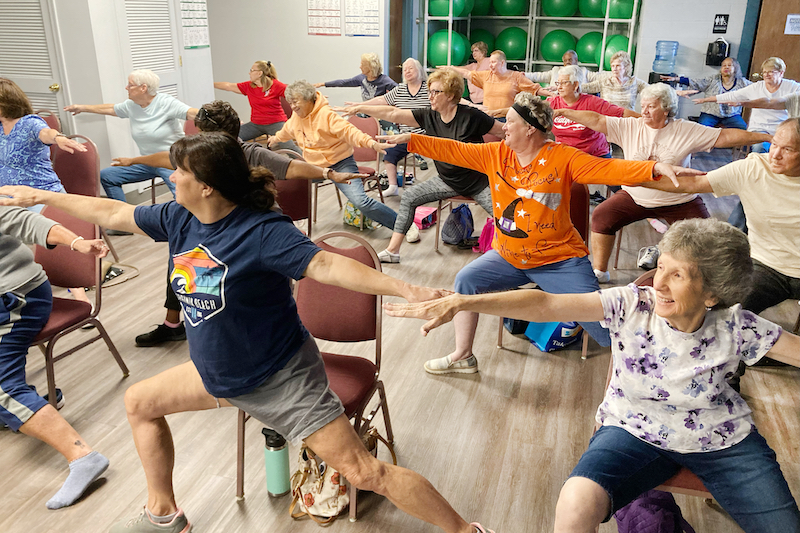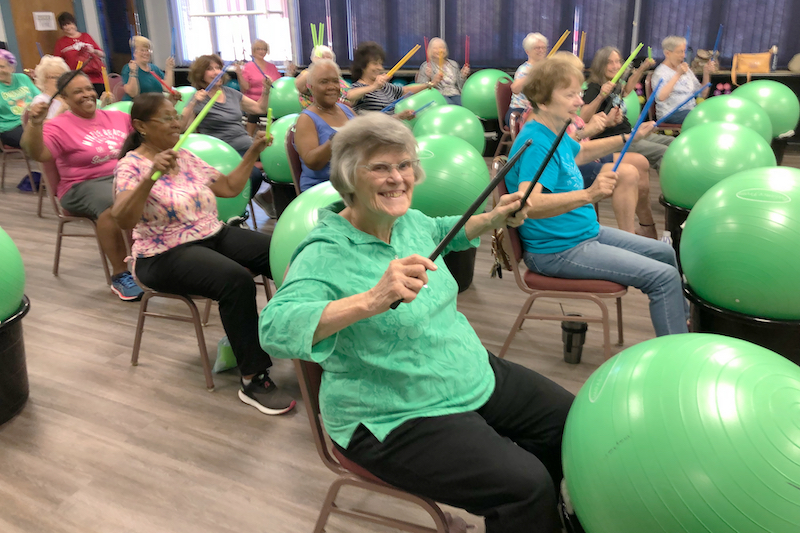


Partners in healthy aging
Photos courtesy of Howard J. Weston Senior Center June 27, 2025
UD team studies statewide healthy aging efforts
At 83, Joyce Dyer is part of the fastest-growing demographic in Delaware, where the 65-and-older population has more than doubled over the past decade, and has noticed changes in her strength and balance over the past few years.
“I seem to think that I can do all the things I did when I was 30,” she said, “but my body doesn't cooperate. I've become very cautious going up and down the stairs.”
Dyer, who is also diabetic, has been learning more about living with chronic conditions, maintaining balance and exercising moderately through healthy-aging classes offered at the Harrington Senior Center. The classes have been funded by a statewide small grant program from the Delaware Division of Services for Aging and Adults with Physical Disabilities (DSAAPD).
To assess the outcomes of the grant program, DSAAPD has engaged an interdisciplinary team from the University of Delaware.
The team, which includes graduate and undergraduate students from both the Joseph R. Biden, Jr. School of Public Policy and Administration and the College of Health Sciences, has considered “the senior centers, the activities that were funded, the lessons learned and recommendations for the state,” said Julia O’Hanlon, lead policy scientist at the Institute for Public Administration in the Biden School, and co-primary investigator on the project.
For students like Brynna Torpey, a 2025 graduate who double-majored in political science and women and gender studies and served as a 2024 Summer Undergraduate Biden School Fellow, the project provided insight on how the community benefits from multiple perspectives.
“Having a background in public administration combined with health behavior can make a great outcome for the public health sector in policy and science,” said Torpey.

“The common denominator,” O’Hanlon said, “is the importance of supporting healthy aging in this state.”
Jillian Orellano, a 2025 graduate of the Health Behavior Science program, spent hours interviewing program participants like Dyer.
“In talking to people, it’s surprising how much the senior center means to them in terms of the friends and connections they've made,” said Orellano. “A lot of people have lost their spouses, and this is the first thing they've done since their husband or wife passed away.”
“We always assess loneliness because that is a key issue with older adults,” said co-investigator Elizabeth Orsega-Smith, professor in the Department of Health Behavior and Nutrition Sciences. “Healthy aging is about optimizing one’s physical, psychological, and social health. Senior centers can serve as a community resource to assist older adults in achieving healthy aging.”
At home in Ethiopia, Mihret Walelgne Menberu — a recent graduate of the Master of Public Administration program with a specialization in health policy — worked with youth and families on topics like HIV and malaria. This project was her first time working with an older population.
“Seniors are struggling in so many ways,” said Menberu. “I really admire how different senior centers are trying their best to meet their needs. And some go above and beyond. It shows you that people still care and love still exists.”
The Harrington Senior Center has increased its membership nearly twofold in two years, so it is offering more programs, local trips and additional sessions. “By offering nighttime sessions, people who work during the day could attend,” said Doug Crouse, program coordinator at the center in southern Delaware. “The programs were so popular. At times, we had to fill a class with those on the waiting list from the previous month.”
But sustaining these programs is a concern.
“You can't just do something that people like and then stop it. It loses momentum,” said Crouse. “But you can never just fully sustain a grant-funded program. If you have that kind of money, you wouldn't need to write the grant.”
With that understanding, the UD team led workshops for senior center administrators on sustaining and improving programming — from identifying funding sources to conducting community needs assessments and reaching new audiences.
“We provided them with a list of resources that they could use to connect within various communities,” said Orsega-Smith. “[They could] partner up with Cooperative Extension, for example, whether it be for healthy eating programs or physical activity.”
“The project is exemplary of the community-based work happening across our university,” said Michael Vaughan, chief community engagement officer in the Office of the Provost. “Through these partnerships, we can help address real-world challenges and advance the public good, especially to address such a critical matter as healthy aging in Delaware.”
Crouse and other senior center administrators are looking forward to continued support to promote healthy aging.
“People just enjoyed the things they did, and I think the grant met its mission to get people up, get people active, and get people moving,” said Crouse.
An engaged university
The University of Delaware has a long tradition of applying knowledge, creativity and civic commitment to the critical challenges facing communities in Delaware, across the nation and around the world. Community-based projects and activities strengthen UD’s identity as an engaged research university.
UD earned the Community Engagement Classification in 2015 from the Carnegie Foundation for the Advancement of Teaching, which recognizes institutions of higher education for reciprocal collaboration with their larger communities.
Contact Us
Have a UDaily story idea?
Contact us at ocm@udel.edu
Members of the press
Contact us at mediarelations@udel.edu or visit the Media Relations website

